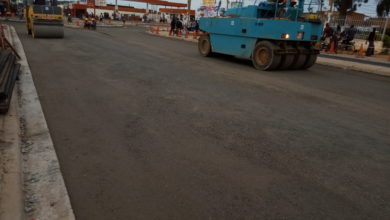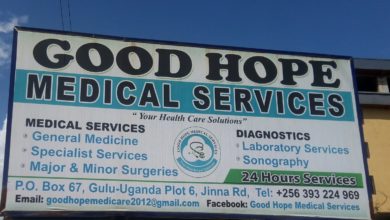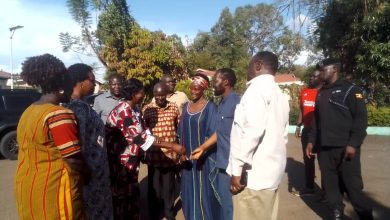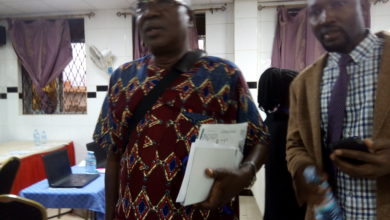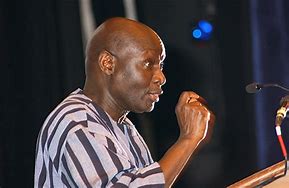
Global Politics
UGANDA: ACHOLI WALKING DEAD TO RISE FROM THE ASHES – AMB. OLARA OTUNNU ON PONGDWONGO 2024 CONVOCATION
Pongdwongo meeting still going on at Restore High School
Amb. Dr. Olara Otunnu addresses Gurre me Pongdwongo (File photo, 2023).
I grew up, a child in a household of the East Africa Revival. Yes, this is akin to the East Africa Revival. That is the level of transformation and revolution and the change that is required, like Saul heading to Damascus and suddenly having to come to a screeching halt and turn the other way.
That is what this society requires at the moral level and the level of material wellbeing. And so, I ask, where is the agency? Who will make it happen, this transformation, this rebuilding, this restoration? Who will be the agents? The national government has a role, God knows, absolutely. Friends outside have a role – Amb Olara Otunnu.
GULU CITY-DECEMBER 25, 2024
By Okumu Livingstone Langol
Prof. Dr. Olara Otunnu, the former UN Under Secretary for Children Affairs during press conference in Gulu broke silence to expose the Acholi cultural degradation and below are the excerpts.
Salutation to key stakeholders
My brother, the founder, executive director of Roco Paco Prof. Sam Kinyera Obwoya, we are very fortunate to have somebody of your stature, your experience, your commitment and passion to be the first executive director of this institution. Thank you very much. When we searched and called, you said here I am. Thank you.
Father Eric (Uma), we thank God for you. We thank God for always showing us the way, for always standing with God’s people and for your fidelity to God’s people. Thank you.
My brother, Justice Alphonse Chigamoi Owiny Dollo. How can I say this, my brother? Thank you for being you. Thank you for your leadership.
Thank you for your humility. And above all, thank you for being with the people. God bless you.
Reasons for Roco Paco
I will ask a few questions and try to answer them quickly because most of the elements which gather us today here have been well covered by my brother Justice Owiny Dollo. What is the reason d’etre, the rationale, the reason for Gure Me Pongdwongo and Roco Paco? This society where we are today, the Lwo Acholi society of this sub-region, has experienced what the Chief Justice called a calamity. In our language we say too paco.
It has experienced a radical, comprehensive societal collapse. I have had the good fortune to visit pretty much every part of the world and I spent many years working in war situations and developing programmes for recovery and reconstruction in post-war situations. I have to tell you, I have never in my entire experience working with the International Peace Institute and the United Nations, not in Latin America, not in Asia, not in the Middle East, not in Africa, not in the Balkans, have I ever seen what I see today in the Lwo Acholi society.
I have never seen this level of collapse anywhere. It’s not an ordinary situation. It’s not a regular development.
It’s not something this or any other society has experienced. This is a total, radical collapse. My brother has said the years of the Amin era disproportionately affected this society.
And then the war which unfolded from 1986 for some 20 years or so, disproportionately affected this society. And of course, the en-masse placement of people in camps, in the conditions in which they lived for some 20 years. The cumulative effects of those episodes in our history have produced what we now see and witness on a daily basis.
Broadly speaking, we can present this crisis, this too paco, this existential crisis, in two broad dimensions. The first dimension is what we can see. Most of the time the scientists can measure. It is the degradation of the material wellbeing here. Education, poverty, public health, etc. But the second aspect of the too paco is more elusive.
But it is the heart of the crisis. It is metaphysical. It is moral. It is intangible. It is not visible. It is what is taking place in our minds, in our hearts, inside of us, in our outlook, in our sense of identity.
All that has collapsed. That is the heart, that is the mother of the crisis we are facing. So, the rationale for the convocation of Pongdwongo was to say, if this is what we are facing, these two, broadly speaking, dimensional crises, what should we do? We, who are in the first instance most affected by it.
So, last year, we convoked all leaders across Acholiland, all leaders, to put our heads together, to discuss and decide what can we, as the most affected, do in the first instance. And then, to begin the duty. So, that’s the reason, the rationale for Gurre Pongdwongo, last year and this year.
Because of the magnitude of this crisis, the motif, the concepts that are most present in our minds are what? They are rebuilding. But that’s not enough. It is restoring.
That’s not enough. It is transforming at the moral, metaphysical level, as well as at the level of material well-being. This is what my brother has called a revival movement.
I grew up in a household of the East Africa Revival. Yes, this is akin to the East Africa Revival. That is the level of transformation and revolution and the change that is required, like Saul heading to Damascus and suddenly having to come to a screeching halt and turn the other way.
That is what this society requires at the moral level and the level of material well-being. And so, I ask, where is the agency? Who will make it happen, this transformation, this rebuilding, this restoration? Who will be the agents? The national government has a role, God knows, absolutely. Friends outside have a role.
Our neighbours have a role. But above all, the agency must begin here. It must begin by those who are wounded, those who are suffering.
Sometimes we speak of wounded healers. The wounded must now become the healers. You hear me.
The wounded. And then, incredible trauma at the psychosocial level, at the material level. We are having the walking dead in this society. The walking dead. So, we who are most affected by this must, in the first instance, take the agency. Do something about this situation.
And then we say, we can then go to others and say, please help us. In this enterprise, there are neither Jews nor Gentiles. There’s no segregation.
We jump in first, but we welcome all women and men of goodwill to accompany us in this historic journey. So, that is the agency.
And in this Gurre me Pongdwongo, this year, the second edition, where will it take place? It will not be in Sir Samuel Baker School. It’s Gurre me Pongdwongo, but the second edition will be in Restore Leadership High School on the Juba Road, just before Seven Corners. That’s where it will take place this year.
When will it be? Same time as last year, meaning it will begin early morning of 27 and end at high noon on the 29th of this month, of December. Who will be the participants in this gathering? If it were possible for us to gather this community, this Luo/ Acholi community in its entirety, we would gather all of them at Restore, because they all need to participate in this.
Unfortunately, we have limited space and limited resources, and because of that, therefore, we are compelled to invite individually and select a few people, a few teachers, a few elders, a few elected officials, a few religious leaders, but all those who are invited, they come on behalf of their fellows who have not been invited.
They go and report back to their friends who have not been invited. So don’t feel bad. Don’t feel left out.
If you don’t receive our invitation, it will only be a few people, but representatives, representing everybody else who may not have come to Gurre-Me pongdwongo. What will be the agenda? The agenda is straightforward. Last year was the inaugural session, it was the first time.
We’re just beginning the conversation. So, this year, we shall begin first by taking stock, by accounting for what happened or not happened in the intervening 12 months or so since last year’s programme. And then we shall decide what should be our homework moving forward.
So, it’s very simple. That is what will be our agenda. Now let me mention a couple of very important points.
Listen to me. First, about the scholarship fund. I ask you, my fellow countrymen and women, how come the society that produced Prof. Okot Bitek, Archbishop Janani Loum, Professor Odonga, how come this society that produced David Otti, Father Antonio Okelo, Alex Latim, Andrew Adimola, Martin Aliker, Daudi Ocheng, the list goes on and on, of men and women who hail from this society are now shadows of their former shelves.
And they were iconic leaders in the country and the continent. What has happened? What has changed? The water, the food, the air? The society no longer produces any of these people? So, the Okot P’Biteks, the Professor Odongas, are still there. In the villages, they are all over. But they have no opportunity. And so, we want to open the door to a few of them and give them the opportunity to follow the footsteps of our forebears who paved the way for us.
Let me say one word about what my brother here is working on. Stand up for just a second. We have suffered an incredible catastrophe, environmental catastrophe.
When we were growing up here in Omoro, in Koch, all over the place, the trees, iconic trees, were everywhere. Today you see what is the precursor of the Sahara visiting us here because we have destroyed all the trees for the “Maka industry”, the charcoal industry. So, one of the most important projects which affects every household in this sub-region is that we must embark on a programme of re-greening this sub-region, of planting 10 trees, 6 trees, 15 trees every year by every household so that we can mitigate the impending desertification of our sub-region. That is exceedingly important.
Pongdwongo convocation will be from 27 to 29 December but let me talk about a precursor. It was in Kampala. It was the Roco Paco Cultural Festival.
One of the greatest gifts that God has given to this society is our culture, our music, our dances, our cuisine, our ododo, our koc, our bonfire place. It’s unique. It’s so special.
And we came together to thank God and celebrate that heritage in Kampala on the 15th December at Uganda Manufacturers Association Show Grounds
We have God’s plan for this region, so let nothing be a barrier to that grand plan.
I thank you, my brothers and sisters. God bless you. Thank you.

